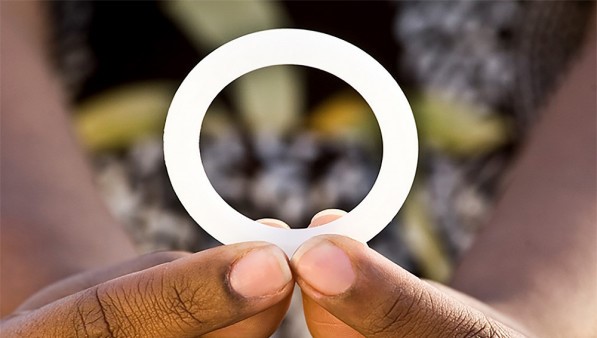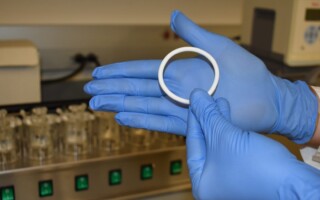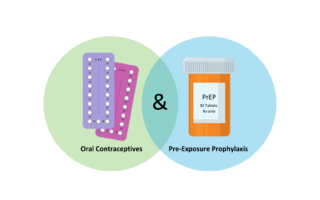
The Issue
HIV remains a major global public health concern with a disproportionate burden on women. Oral pre-exposure prophylaxis (PrEP) has been an important HIV prevention product, but uptake and adherence has remained low. Long-acting injectable prevention methods are starting to be available but supply to low- and middle-income countries will be limited for several years. To achieve the Sustainable Development Goal of ending the HIV epidemic by 2030, women must be able to choose among a range of HIV prevention options that address their different needs and preferences, as recognized in the UNAIDs Choice Manifesto.
The Product
The monthly dapivirine vaginal ring (DVR), also known as DapiRing™ or “PrEP ring,” is a user-controlled method that can reduce the risk of HIV transmission during vaginal sex. Once the woman inserts the ring, it sits inside the vagina near the cervix where it slowly releases the antiretroviral drug dapivirine at the site of potential infection. Dapivirine works by blocking HIV’s ability to make copies of itself inside healthy cells. The DVR received a positive scientific opinion in July 2020 from the European Medicines Agency (EMA) for use among women ages 18 and older. The ring has also received prequalification and a recommendation from the World Health Organization. The DVR now has regulatory approval in several countries in sub-Saharan Africa with additional registrations under review.
The Population Council is currently developing a three-month DVR as a line-extension of the monthly DVR, with plans to submit for EMA review in the near future. The three-month DVR is the same size and shape as the monthly DVR and is expected to significantly reduce the annual cost of HIV prevention as women would use 4 rings a year versus 12. Pending a positive review from the EMA, regulatory approval would be sought in sub-Saharan Africa while exploring options for access in additional regions.
The Progress
A Phase I trial (IPM 054, NCT05416021) to investigate the relative bioavailability of the monthly DVR compared to the three-month DVR found that a three-month DVR delivers the active antiretroviral drug, dapivirine, at levels superior to those of the monthly DVR. The trial, conducted among 124 women in South Africa, suggests that the longer-acting ring will be as effective as the monthly ring, offering a more cost effective and convenient option to women who continue to seek options to prevent HIV infection during sex. Data from this study will support the line-extension filing for the three-month DVR to the EMA, which is expected to be submitted in 2025. Acceptability data collected in IPM 054 indicate that most women would be willing to use the three-monthly DVR, supporting the case for convenience in addition to cost-efficiency of the longer-acting product.
The Population Council is engaged in scaling and optimizing the three-month DVR manufacturing process to further improve the cost of goods and reduce production costs. The Population Council has signed a memorandum of understanding with Kiara Health, a 100% Black-owned African-based pharmaceutical manufacturing and health care solutions company, for commercial distribution and manufacturing of the three-month DVR. Once a license is in place, this would shift the leadership of the DVRs to sub-Saharan Africa, where the need for HIV prevention products by women is the most urgent.
As announced in July 2024, the Children’s Investment Fund Foundation (CIFF), in partnership with the Global Fund to Fight AIDS, Tuberculosis and Malaria (the Global Fund), will launch an initiative of up to $2 million USD over the 2024–2025 period for the purchase of approximately 150,000 monthly DVRs in countries that implement Global Fund grants to fight HIV and AIDS. In collaboration with other partners, including Unitaid, the initiative also aims to bridge the gap to the lower-cost, three-month DVR which will lead to lower prices over the long-term.
The Impact
The three-month DVR could represent a nearly 60 percent price reduction to the one-month ring, with further price reduction opportunities still being explored. This price reduction will enable broader access by reducing the annual cost of HIV prevention. By increasing convenience to women, the three-month ring may also increase acceptability and adherence, and may lead to fewer gaps in between ring usage. The three-month DVR will expand options and choice for women to protect their health and accelerate global efforts to end the HIV epidemic.




